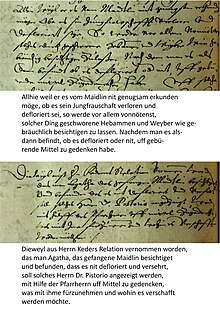Agatha Gate
Agatha Gatter (* 1589 ; pardoned in 1604 and moved to Constance) was, in a broader sense, a victim of the witch hunts in Freiburg, in which 25 women were executed as alleged witches in Freiburg from 1599 to 1603 .
Agatha Gatter was the daughter of the laundress Ursula Gatter from Waldkirch , who was executed as a witch in Freiburg in August 1603. Ursula, the mother, had confessed to witchcraft under torture and was therefore beheaded before she was burned at the stake .
After the mother was executed, her 14-year-old daughter Agatha Gatter was interrogated . The girl gave the following false statement on the record, presumably to avoid the torture: "that it was not only for ten times at witches' meetings with an intended mother of his being, but that God and his saints were also denied and that the evil spirit had two different times mollified" be.
A lawyer from the University of Freiburg named Theodor Metzger was asked for an opinion . In the report, which he read out to the city council on November 5, 1603, Metzger recommended that Agatha Gatter should be imprisoned until the age of 16, but then, if the suspicion of witchcraft persists, subject to torture and then execute after the confession .
"In this case, however, Mr. Binsfeldius, who was informed about it, gave this advice in his tractate, suggesting that such young people should be treated with such young people until they are at least sixteen years old, who would be punished for death, keep them in a tolerable prison and in between divine matters and should teach ... 'If, however, ettier neie iudicia, suspicion and suspicion of this vice should fall for the sake of exploring the thorough truth, then again in a benevolent or embarrassing inquisition through the torture and after finding the wrongdoing the beloved iustitiam administrate and exequire . '"
Those subjected to torture had little chance of getting away with life, so this opinion amounted to a death sentence.
On November 17, 1603, Johannes Pistorius stepped in and told the Freiburg city council that he wanted to interrogate the girl again. As a doctor and lawyer, he wanted to reduce the unbelievable confession to absurdity. Jury midwives and women should examine the girl for virginity. Three days later, the council representative Jacob Keder reported the result. The girl was “pardoned, the strict legal arrogance and with the advice of the legal and spiritual special mr. Johann Pistory […] one frawen are hired for breeding and costing in Constantz. […] So pulled away, Monday January 12th anno 1604. "
Johannes Pistorius found a family that Agatha Gatter could go to after her release from prison.
Commemoration
A plaque on Martinstor commemorates the victims of the Freiburg witch trials.
Individual evidence
- ↑ Hans-Jürgen Günther: Courageous against the witch craze. In: Badische Zeitung from June 17, 2008.
- ↑ Freiburg City Archives, Council minutes B5 (P) XIII a, No. 42, p. 199 r. dated September 12, 1603
- ^ Acquittal for Agatha Gatter obtained by Johannes Pistorius, Freiburg city archives, Vergichtbuch 1550–1628, p. 627 v.
| personal data | |
|---|---|
| SURNAME | Gate, Agatha |
| BRIEF DESCRIPTION | Victims of the witch hunts in Freiburg |
| DATE OF BIRTH | around 1589 |
| DATE OF DEATH | 17th century |
| Place of death | Freiburg in Breisgau |

